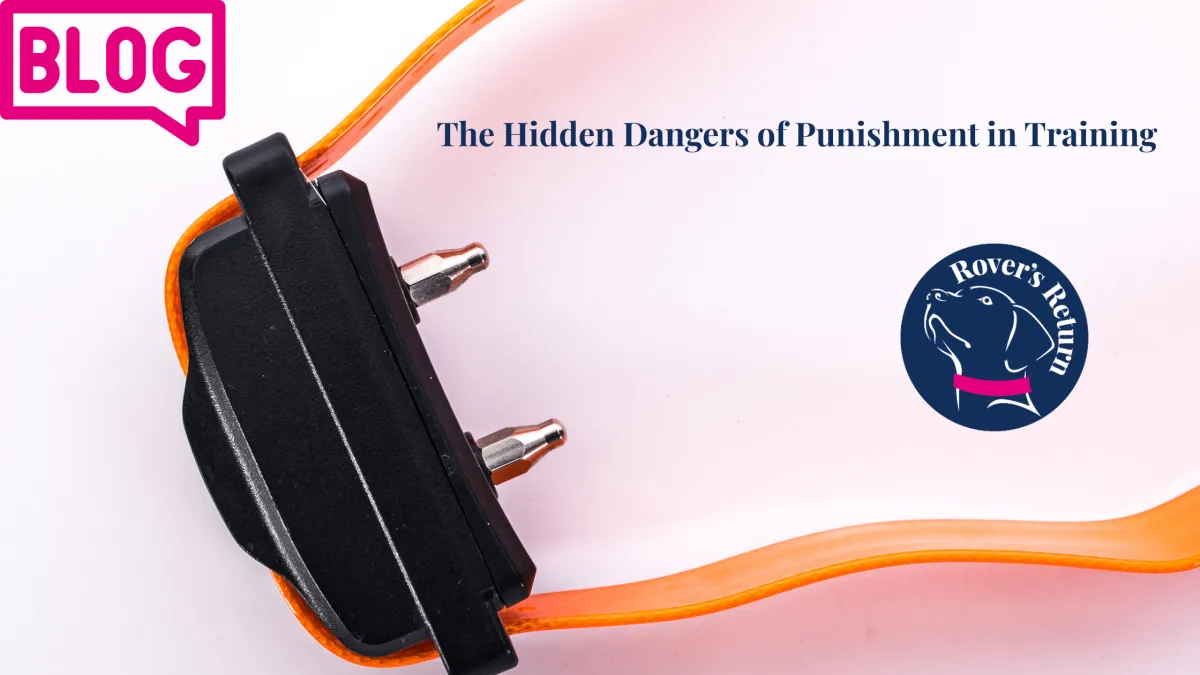Book a FREE 1:1 Assessment Call By Clicking HERE
Specialising In Dog Reactive Behviour
Accredited by APDT, ABTC and UK DOG Behaviour and Training Charter
Qualified and Experienced
Force Free Trainer and Behaviourist
Dog Training Leicestershire Educational Blogs

The Hidden Dangers of Punishment in Training
Why "Tough Love" Harms Your Dog: The Hidden Dangers of Punishment in Training

Training your dog can be one of the most enriching journeys you'll share. It's a chance to build understanding, trust, and a truly special bond. Yet, the path you choose for training dramatically impacts your dog's well-being and your relationship. While there are often heated debates about the "best" methods, a strong consensus among experts and animal behaviourists advises firmly against using punishment.
This article dives into why punishment-based training is not just ineffective, but potentially damaging, and explores how you can build a happier, more harmonious relationship with your canine companion through kinder, more scientific methods.
What Exactly Is Punishment in Dog Training?
Before we go further, let's clarify what we mean by punishment. In the context of dog training, punishment basically is implementing anything the dog doesn’t like, it isn't just about being "tough" or setting boundaries (this isn’t always punishing, often boundaries, when implemented well can help). Scientifically, punishment is anything applied to a dog that they find uncomfortable, harmful, or painful, with the specific intent to stop a behaviour.
This can manifest in many ways:
Physical: Yelling, hitting, leash jerks, ear pinches, or using tools like e-collars (shock collars), prong collars, slip leads, or even harsh sprays of water.
Verbal/Intimidating: Harsh scolding, growling, or using intimidating body language.
The key is the effect: if the behaviour stops, the dog has been punished.
It doesn't matter if a trainer tells you a tool is "conditioned" to be kind; or it doesn’t hurt the dog.
If it stops a behaviour, it's because it's aversive to the dog.
The Problem with Punishment: A "Toxic" Side Effect
You might hear arguments that punishment "works quickly." And yes, it will suppress a behaviour at the moment because, as living beings, dogs (like us) are hardwired to avoid pain and discomfort for survival. The brain’s immediate priority is self-preservation.
However, this "quick fix" comes at a steep, hidden cost. As renowned behaviourist Murray Sidman (1989/2000) eloquently stated:
"Whenever we are punished, more and more elements of our environment become negative reinforcers and punishers. We come more and more under coercive control, and we rely more and more on counter coercion to keep ourselves afloat. That is why conditioned punishment is a 'toxic' side effect of punishment. Environments where we are punished become punishing themselves, and we react to them as natural punishers."

What does this mean for your dog?
Your Dog Learns to Fear the Environment (and You!): If your dog is consistently punished for jumping on guests, those guests, the doorbell, or even the living room itself can become "punishing" cues. Instead of learning what to do, your dog learns what not to do to avoid pain or fear. This can make them anxious, hesitant, or reactive in situations that should be neutral or even positive.
Suppression, Not Solutions: Punishment suppresses behaviour; it doesn't change the underlying emotion or teach an alternative behaviour. If an e-collar stops a dog from chasing squirrels, the instinct to chase doesn't disappear. The dog might simply find another, perhaps less desirable, outlet for that energy, or develop anxiety around squirrels instead.
Eroding Trust: Imagine if every time you made a mistake, someone hurt or scared you. You'd likely become wary, stressed, and less trusting of that person. It's the same for dogs. Punishment damages the bond between you and your dog, leading to fear, anxiety, and potentially aggression. A dog who fears you won't learn effectively from you.
Confusion and Inconsistency: Punishment is often applied inconsistently, making it nearly impossible for your dog to understand what they "did wrong." This leads to confusion and frustration, not learning.
The "Pessimism" Effect: Scientific studies, like one from 2021, have even shown that dogs trained with punishment exhibit more "pessimistic" cognitive biases than those trained without it. In other words, it can literally make them feel less optimistic about life.
Ethical Concerns: Modern animal welfare standards and the vast majority of certified professional dog trainers advocate for humane, positive reinforcement methods. Punishment-based training is increasingly seen as outdated and unnecessary.
The Power of Positive Reinforcement: Building a Better Bond
So, if not punishment, then what? The answer lies in understanding how dogs truly learn: through positive reinforcement.
The science behind this isn't new. It's built on principles like Edward Thorndike's "Law of Effect" (responses that produce a satisfying effect are more likely to be repeated) and the work of Ivan Pavlov on classical conditioning (dogs associating footsteps with food) and B.F. Skinner on operant conditioning (behaviour that is reinforced tends to be repeated).
In short: when you reward a behaviour, your dog is more likely to repeat it. This means using things your dog values – food, toys, praise, attention – to mark and reward the behaviours you want to see.
This isn't about "bribing" your dog. It's about clear communication, building positive associations, and creating a learning environment where your dog feels safe, confident, and eager to participate. It's about teaching them what to do, rather than just telling them what not to do.
Beyond "Quick Fixes": Patience, Knowledge, and Lasting Change
Some critics of force-free methods argue that they ignore dangerous behaviours or aren't effective for larger or "difficult" breeds. This simply isn't true. All dogs, regardless of size or breed, experience emotions and learn in the same fundamental ways. Positive reinforcement, applied skilfully through techniques like desensitization and counter-conditioning, can effectively change even the most challenging behaviours by addressing the underlying emotions.
It takes knowledge, patience, and consistency. There are no true "quick fixes" in effective behaviour change because you're working to shift emotions and build new habits, not just suppress a symptom.
Conclusion: Choose Kindness, Build Trust
Training your dog should be a joyous, collaborative journey. By avoiding punishment and embracing humane, science-backed positive reinforcement techniques, you won't just achieve better behaviour; you'll forge a deep, trusting bond with a happy, confident, and well-adjusted companion.
Don't be swayed by flashy social media videos promising instant results. Real, lasting change takes effort and understanding. If you're struggling with your dog's behaviour, reach out to a certified force-free professional. It's the most loving and effective choice you can make for your best friend.

Highly Qualified Behaviourist
Accredited by APDT, ABTC and UK DOG Behaviour and Training Charter
Accredited Scentwork Instructor
Force Free Trainer and Behaviour
Force Free Trainer and Behaviour
Accredited Scentwork Instructor
Accredited by APDT, ABTC and UK DOG Behaviour and Training Charter
Highly Qualified Behaviourist
Contact Us
Sam: 07725 802995
You can contact us via Live Chat button at the bottom of the screen or the contact box to the right.
You can also book one of our services online using the View Dates buttons under the service you require.
© 2023 by Rovers Return Dog Trainers Academy - Force Free Dog Training Lutterworth, Broughton Astley, Leicestershire, Hinckley, Nuneaton, Stoney Stanton, South Kilworth, Ullesthorpe
Privacy Policy | Terms and Conditions | Terms and Conditions of Services | Sitemap


Facebook
Instagram
X
LinkedIn
Youtube
TikTok